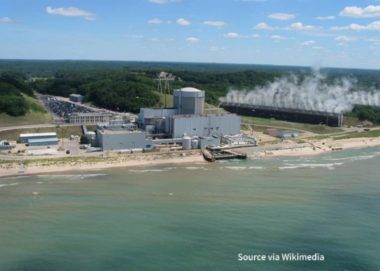The Biden administration unveiled a groundbreaking $1.5 billion loan to resuscitate the Palisades Nuclear Plant situated in Covert Township, Michigan. The loan, facilitated through the Energy Department’s Loan Program’s Office, utilizing funds from the Inflation Reduction Act, marks a pivotal step towards reigniting the plant’s operations. Once operational, this endeavor will stand as a hallmark, marking the first instance of the United States recommissioning a shuttered nuclear facility.
Previously operational from 1977 until 2022, the plant underwent acquisition by a Louisiana-based utility in 2007. Pending approval by the Nuclear Regulatory Commission, the restoration endeavors aim to revive the 800-megawatt capacity of the Palisades plant, envisaging sustained power generation until at least 2051. Complementing this federal initiative, the state Legislature has earmarked $150 million towards the recommissioning efforts. With a targeted restart projected for late 2025, the collaboration between the administration and the state of Michigan promises to reshape the energy landscape.
Pioneering Clean Energy Workforce Expansion
Echoing the significance of this revitalization, Energy Secretary Jennifer Granholm emphasized the pivotal role of nuclear power in mitigating carbon emissions and driving economic growth. Granholm lauded President Biden’s visionary “Investing in America” agenda, underlining its instrumental role in fostering a vibrant clean energy workforce. The resurgence of the Holtec Palisades nuclear power plant not only underscores Michigan’s commitment to sustainable energy solutions but also positions it as a frontrunner in clean energy innovation.
Governor Gretchen Whitmer, echoing Granholm’s sentiments, hailed the collaborative efforts that culminated in this historic milestone. With bipartisan support from the Michigan Legislature, coupled with the proactive engagement of the Biden-Harris Administration, Holtec, and labor stakeholders, the resurgence of Palisades Nuclear plant sets a precedent for transformative change.
Revival of Palisades Nuclear Plant:Toward a Greener Tomorrow
Amidst the administration’s ambitious target of achieving a 100 percent renewable electrical grid by 2035, the revival of Palisades nuclear power plant emerges as a pivotal component in the broader clean energy agenda. While acknowledging past apprehensions surrounding nuclear energy, particularly post-incidents like the 1979 Three Mile Island accident, policymakers emphasize its unparalleled potential in decarbonizing the energy sector.
With Palisades Nuclear Power plant poised to lead the charge as the first successfully restarted nuclear power plant in American history, the economic and environmental dividends are poised to reverberate far beyond Michigan’s borders. As the nation charts a course towards a greener tomorrow, initiatives like the Palisades Nuclear plant revival stand as beacons of progress, emblematic of the collaborative efforts driving the transition towards a sustainable energy future.
Concerns Raised by Nuclear Opponents
Nuclear critics have voiced their concerns over the decision to restart the Palisades Nuclear Power Plant, arguing that the billions invested could be better allocated to renewable energy sources like wind and solar power. Kevin Kamps, a specialist in radioactive waste with Beyond Nuclear, emphasized the plant’s age and safety issues, suggesting that its operation poses significant risks of a meltdown. Beyond Nuclear has been vocal about the potential dangers associated with nuclear energy, particularly regarding safety protocols and maintenance standards.
Kamps highlighted the apprehensions surrounding the plant’s reopening, citing worries about Holtec’s ability to address maintenance and inspection gaps during its closure. Describing the situation as “radioactive Russian roulette,” Kamps emphasized the gravity of the safety risks involved in restarting the plant. Despite these concerns, Michigan Governor Granholm and Holtec officials attempted to allay fears during a visit to the plant, asserting confidence in its safety record and operational integrity.
Legislative Efforts to Promote Nuclear Energy
In response to the push for nuclear energy expansion, a bipartisan group of state Representatives introduced legislation aimed at incentivizing nuclear energy generation and positioning Michigan as a national leader in the sector. House Bills 5606-5609 outline measures to facilitate the establishment of small modular reactors, presenting them as a safer and more cost-effective alternative. The proposed legislation includes provisions for siting requirements, grants for educational programs in nuclear and hydrogen industries, financial incentives for graduates entering these fields, and tax credits for small modular reactor research and development.
Representative Graham Filler underscored the importance of investing in nuclear technology for meeting energy needs while prioritizing safety and environmental concerns. Similarly, Representative Joey Andrews hailed the Palisades Nuclear Power Plant repowering effort as a positive development for Southwest Michigan, offering economic relief amidst ongoing challenges. The legislative push reflects a concerted effort to embrace nuclear energy as a viable solution for reducing greenhouse gas emissions and fostering economic growth in the region
Table of Contents
Discover more from OGM News NG
Subscribe to get the latest posts sent to your email.














